Moving forward in rail
Q&A with Gerry Glover, ETU Rail Organiser
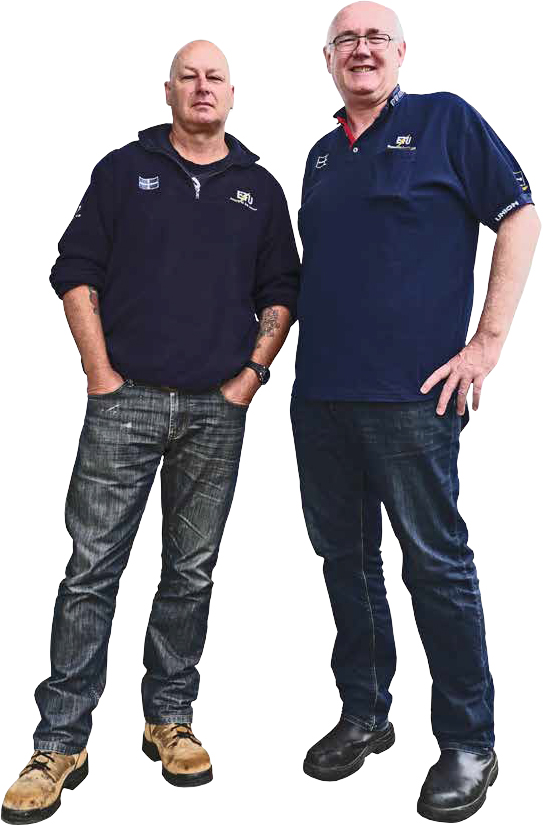 Gerry Glover has been the ETU’s rail industry organiser since 2002. He has gained a wealth of experience and seen a lot of changes in that time, including the privatisation of the industry. Now, with unprecedented government investment flowing into the network, there are more changes and exciting opportunities on the horizon.
Q What do you like most about the rail industry?
It’s diversity. The workforce includes lineworkers, electricians, signal maintenance technicians, assistants, track workers, supervisors – and they’re all members of the ETU. Most of the issues we deal with stem from collective agreements, but we have some members who are on common law contracts as well.
Q What are some of the changes you have seen in the industry over the years?
Gerry Glover has been the ETU’s rail industry organiser since 2002. He has gained a wealth of experience and seen a lot of changes in that time, including the privatisation of the industry. Now, with unprecedented government investment flowing into the network, there are more changes and exciting opportunities on the horizon.
Q What do you like most about the rail industry?
It’s diversity. The workforce includes lineworkers, electricians, signal maintenance technicians, assistants, track workers, supervisors – and they’re all members of the ETU. Most of the issues we deal with stem from collective agreements, but we have some members who are on common law contracts as well.
Q What are some of the changes you have seen in the industry over the years?
I took over just after privatisation, when there were a lot of teething problems. We had a lot of redundancies at the time, but otherwise it was like nothing had really changed. The major changes took place when Metro Trains Melbourne (MTM) took over in 2009. At that time the government made sure there was a lot of money available for renewal work.
Since then we’ve seen sleeper replacements, infrastructure changes and major projects. There is now a long-term plan to expand and upgrade the network.
In the last eight years we’ve seen new and upgraded railway stations built, more track maintenance and a lot more passengers using the service.
Q What is your view on public versus private ownership of the system? Which is better?
If it was still publicly owned today I would probably say ‘Why change it?’. But almost 20 years after privatisation, would I want it to go back to public ownership? No.
VLine and Metropolitan Rail were both privatised in 1999, but the government took back ownership of VLine in 2004.
Negotiating with VLine is much more difficult because there are so many more barriers. You’re limited in what you can negotiate because of government policy, and when there is a conservative government they take a very hard line. In contrast we have always done well negotiating with Metro, with wages growing by 300% since 2000.
Q How have you managed to achieve such high wages growth?
We’ve brought in different allowances and had good wage outcomes and classification reviews. It all adds up. Last year’s agreement had a magnificent outcome, with a 14% wage increase over four years, all overtime at double time and we changed a flat allowance to an all-purpose allowance.
Q How have you found working with different governments and their different approaches over the years?
I’ve been lucky that there has been a Labor government for all but four of the years I have been the rail organiser. When the Liberals were in power they never bothered to talk to us and were even prepared to shut the rail system down for weeks if we took protected industrial action.
Now under Daniel Andrews we have a government that campaigned on investing in the rail system and has delivered. One of the best things Daniel Andrews has done is to appoint Jacinta Allen as transport minister. She is very approachable, has delivered on the government’s promises and is doing a magnificent job.
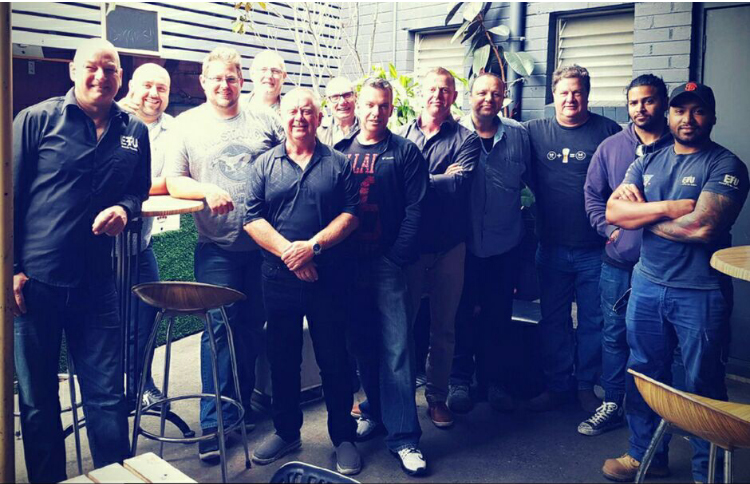 This is the first government I’ve seen that has been so pro-public transport. Since the Andrews Government was elected we’ve seen investment in level crossing removals, rail duplications, rail extensions, 55 new next-generation trains to be built at Newport, $750 million for a new rolling stock maintenance depot at Pakenham East, a new satellite maintenance centre at Calder Park and preparations for the introduction of new high-capacity signalling. Our membership will grow to well over 1,000 in projects and construction over the next few years because of all this new work.
Q Tell us a bit about your shop stewards network in the rail industry.
This is the first government I’ve seen that has been so pro-public transport. Since the Andrews Government was elected we’ve seen investment in level crossing removals, rail duplications, rail extensions, 55 new next-generation trains to be built at Newport, $750 million for a new rolling stock maintenance depot at Pakenham East, a new satellite maintenance centre at Calder Park and preparations for the introduction of new high-capacity signalling. Our membership will grow to well over 1,000 in projects and construction over the next few years because of all this new work.
Q Tell us a bit about your shop stewards network in the rail industry.
We have about 60 shop stewards in rail, including 32 who represent our 550 members at Metro. They are all very well trained and about half of them can solve issues themselves at the workplace level. We also have shop stewards at VLine, Yarra Trams and the Ballarat and Bendigo Rail Workshops.
Q How do you see the future of the rail industry?
It’s very positive. The infrastructure investment coming down the pipeline will bring Melbourne into the 21st century. It will be a very modern rail system when the work is complete. In the future I would love to see a fast rail link between Melbourne and Sydney. It will be expensive ($18 billion is the figure I’ve heard), but it would cut travel time to three hours, which is competitive with flying.
Q&A with Andrew Taranto, ETU Shop Steward in the rail industry
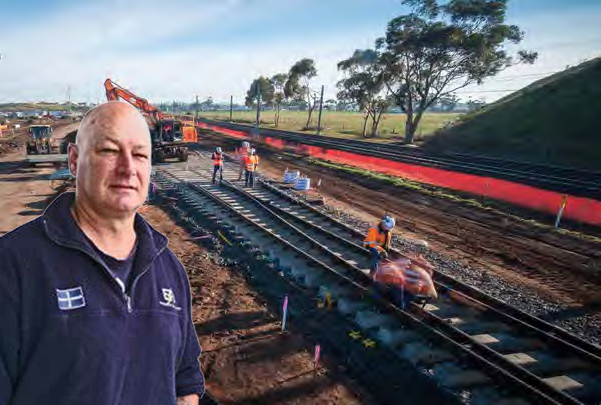 Meet Andrew Taranto, a 36-year veteran of the rail industry. As a shop steward, he represents members in overhead and is an ETU State Councillor. Andrew was responsible for training former ETU Assistant Secretary Wes Hayes during his apprenticeship and first crossed paths with Secretary Troy Gray in 2000, during Troy’s first major dispute. He has a wealth of experience in the rail industry and the union and shares some of his wisdom and insight with us in this Q&A.
Q What’s your role at Metro all about?
Meet Andrew Taranto, a 36-year veteran of the rail industry. As a shop steward, he represents members in overhead and is an ETU State Councillor. Andrew was responsible for training former ETU Assistant Secretary Wes Hayes during his apprenticeship and first crossed paths with Secretary Troy Gray in 2000, during Troy’s first major dispute. He has a wealth of experience in the rail industry and the union and shares some of his wisdom and insight with us in this Q&A.
Q What’s your role at Metro all about?
I started out as a traction lineworker in the overhead section of the rail network, working on the tools for 25 years after I finished my apprenticeship. I’m now the project coordinator for the overhead section.
Q How long have you been a shop steward and what do like about the role?
I’ve been the shop steward for about 16 years now. I first got involved in 2000 when we had a blue over privatisation. It was the first blue that Troy Gray was involved in. Upon privatisation a handful of guys went into the private sector as linies and were paid $4 an hour extra. We said we want parity and the company said ‘keep dreaming’. So we stacked on a turn and things came to a head. The guys then realised they had a bit of clout, which was very satisfying.
I’m an experienced shoppie now, and it’s the relationships you have with management and the ability to circumvent issues before they become apparent that I find most satisfying. Blokes will ask a question and you can get an immediate response from management, which comes from the rapport you have with them. That comes with time in the job and time as a shop steward.
After privatisation they gutted the joint, and we were down to 37 staff in overhead. We lost about half our staff to redundancy packages, which was never anticipated. Then there was a slow build back. As things started to settle down post privatisation we got more heads in the door. The RTBU [Rail, Tram and Bus Union] was falling apart at the time, which helped us pick up membership, and now we’ve got about 95% coverage in overhead and 60% in Metro overall. Pay rates have risen since privatisation by about 300%.
Q So would you say that privatisation has been a good thing for the industry?
It’s been a good thing for the workers, absolutely. It’s exposed us to market forces, which has been a positive. Today we’ve probably got better terms and conditions than the distribution sector. Management tries things on all the time, but we say ‘No, it’s not happening’, and they generally listen to us. This is partly because we have the knowledge and history of what has come before.
It’s easier to negotiate with a privatised company like Metro than with a government-owned entity like VLine. It’s chalk and cheese. We can negotiate and we get better and quicker outcomes with Metro.
Metro cops a lot of criticism, but they are throwing plenty of money at the business. They inherited a business that had been run down and if it returned to public ownership I can see that happening again.
Q How do you feel about the future of the industry and all the infrastructure works on the horizon?
I think it’s a bright future with the commitment from this government on level crossing removals. There’s another five to six years’ work there minimum, and we’re up to our ears in it. Then there’s the Metro Tunnel. The only concern we’ve got is that there’s a reluctance to hire people directly; there’s a lot of use of contractors. I’d like to see more heads put on, including trainees and apprentices.
Q Would you recommend working in the rail industry to other electricians?
Yes I would – working in the rail industry is a good thing. Metro is the ETU’s single largest shop and most of those members are now earning more than sparkies in the contracting industry. So it’s now a very attractive place to come and work.
Q&A with Jacinta Allen, Minister for Public Transport and Major Projects
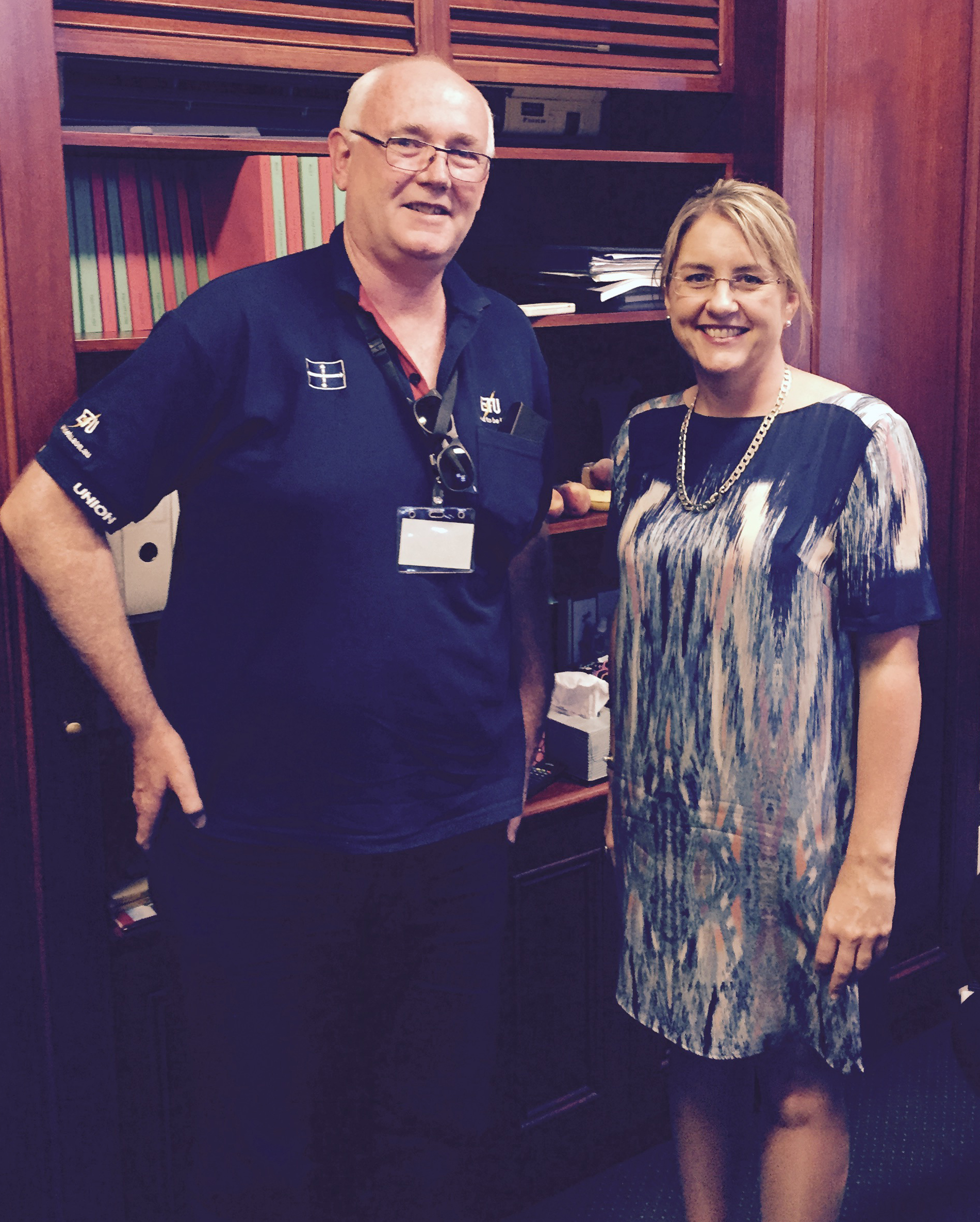
Q Congratulations on the terrific job you are doing in the public transport and major projects portfolio. Has there ever been as much investment in expanding Victoria’s rail network as we’ve seen under the Andrews Government?
By any measure the current level of investment in rail infrastructure in Victoria is at record levels under the Andrews Government. Projects include the $11 billion Metro Tunnel, the removal of 50 level crossings, the train extension to Mernda, the Murray Basin rail project and the Ballarat line upgrade. There is also record levels of investment in our rolling stock, including 65 new high-capacity trains. So there’s record funding but, just as importantly, record jobs, with the best local content, skills and training provisions in Australia.
Q We understand that you have a family connection to the ETU. Could you tell us a little bit about your father’s history with the union?
My family has a long history of being actively involved with the union movement and the ALP. My grandfather was the Bendigo Branch President of the ALP and a long-time shop steward for the Australian Railways Union in Bendigo.
My father first joined the ETU in Bendigo in 1964 and served in a variety of roles, including as a shop steward and Sub Branch Secretary up until his retirement in 2008. He has been an ETU delegate to the Bendigo Trades Hall council from 1976 until today.
Q Your government has initiated several massive infrastructure projects since coming to power, including level crossing removals, the Metro Rail Tunnel, the Western Distributor and more. Why has this been a priority for you and how are they contributing towards growth and job creation in the state?
Prior to the 2010 election, the then Liberal Opposition promised a series of new train lines, including to Rowville, Doncaster and Avalon airport. Once elected they delivered none. They didn’t start a single major rail project. They left the plans for the Metro Tunnel sitting on the shelf for four years. Their legacy left an already congested public transport and road network bursting at the seams. Victorians voted in the Andrews Government to get on with it and that is what we are doing. Victoria has the highest population growth in the country, and these projects are essential to keep Victoria moving and continue our strong economic and jobs growth. The local content provisions in all our contracts are ensuring that jobs are created for locals right across our infrastructure projects. The benefits of this are being realised, with thousands of Victorians being employed on the 10 level crossings that have already been removed.
Q Do you think we will ever see an airport rail link built in Melbourne?
Yes. The independent Infrastructure Victoria has recommended that a rail link to the airport be constructed within 15 to 30 years. A rail link to the airport is dependent upon the Melbourne Metro Tunnel project being delivered first. Without the tunnels the rail link would simply be transporting people from the airport into a gridlocked city loop.
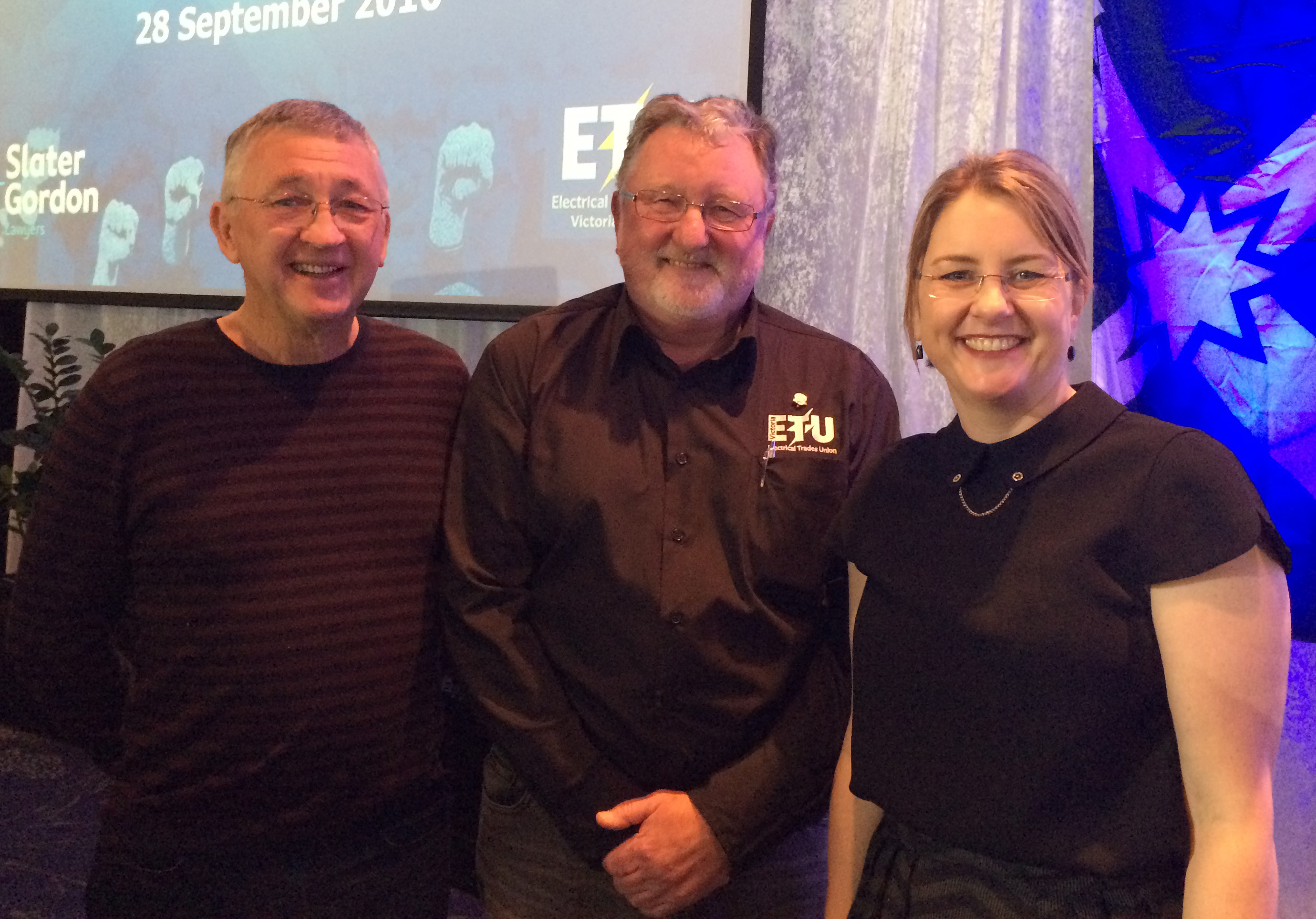 Q A fast rail link between Melbourne and Sydney is the dream that never dies for infrastructure fans. Do you think it is viable and do you expect to see it built one day?
Q A fast rail link between Melbourne and Sydney is the dream that never dies for infrastructure fans. Do you think it is viable and do you expect to see it built one day?
I think it can be viable and would love to see it built. The project needs leadership from the Commonwealth Government, and Anthony Albanese, Labor’s Shadow Infrastructure Minister, has been a passionate advocate for the project for many years. The Victorian Government will continue to work proactively with all sides of politics to design and develop a project that stacks up and can be delivered.
Q Your government is also investing heavily in road transport infrastructure. What made you decide that the Western Distributor is a better option for Melbourne than the East-West Link? When do you expect construction to begin and jobs to become available on the project?
In contrast to the former government, the Andrews Government assesses infrastructure projects on merit. The Western Distributor project, which includes the Monash Freeway Upgrade and upgrades to Webb Dock, has been assessed to have a far greater cost-benefit ratio than the East-West Link.
Work on the Monash Freeway upgrade has begun, with work on the Western Distributor expected to start next year subject to final planning and environment approvals. The project is estimated to create 5,600 jobs.
The government has also announced we will build the North East Link connecting the Ring Road to the Eastern Freeway. Planning work is underway.
Q How have the government’s plans been affected by the federal government’s failure to provide Victoria with its fair share of federal infrastructure funding? Is there more you would like to do in rail if the funding was available?
Victoria is currently being forced to go it alone on infrastructure. Despite having 25% of the nation’s population and the fastest growing population rate in the country, the Turnbull Government has allocated Victoria less than 8% of its infrastructure budget over the next five years.
In contrast New South Wales gets more than 30%. Tony Abbott was upfront – he declared he wouldn’t fund public transport. Malcolm Turnbull frequently professes his love of Melbourne’s public transport and claims he will fund it, but he hasn’t provided any new funding in Victoria. The Andrews Government has refused to let the Commonwealth Government’s lack of funding hold back our state. For example, we have already announced we will fully fund the $11 billion Metro Tunnel project. However, there are many much-needed projects right across Melbourne and Victoria that could be bought forward if Victoria received our fair share of funding.
This article is from the Autumn 2017 issue of the ETU's members magazine. You can read the digital edition here.